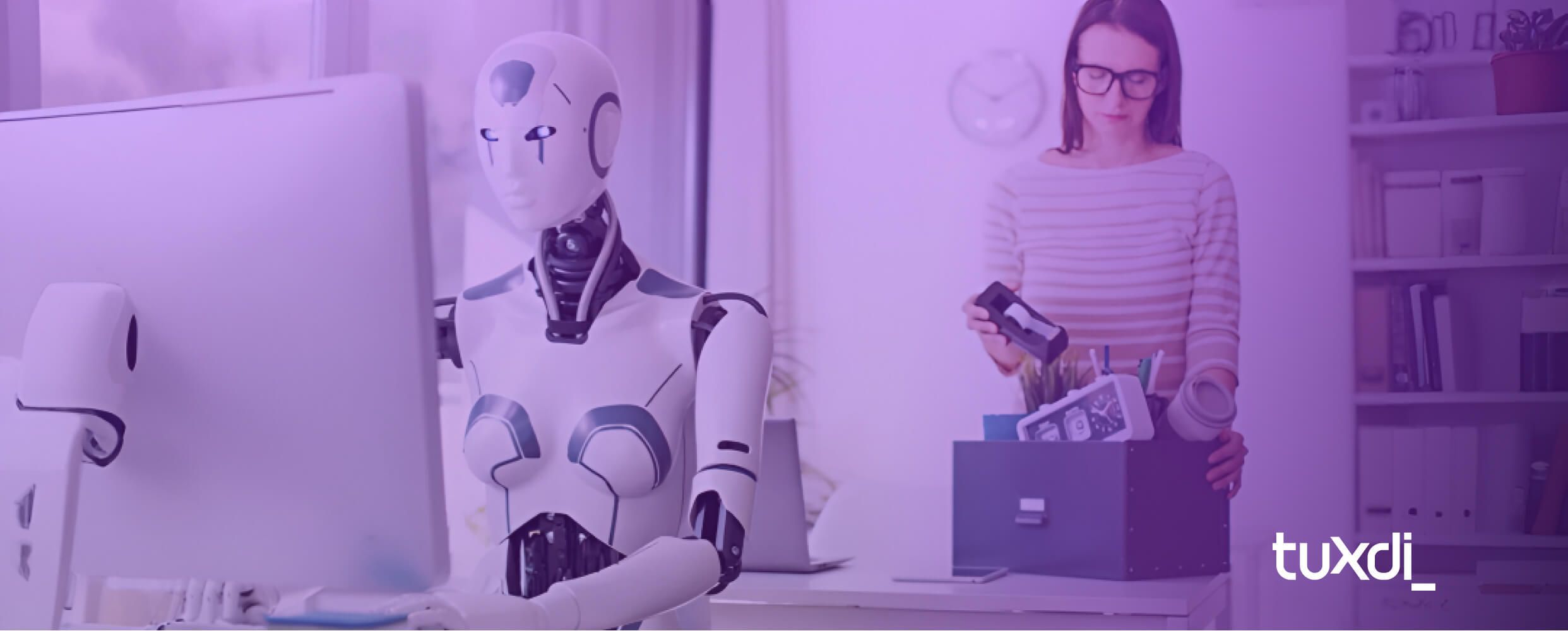0
1
0
1
2
3
4
5
6
7
8
9
0
0
1
2
3
4
5
6
7
8
9
Is Your Job at Risk from AI? Ultimate Guide to Safeguarding Your Career
In recent years, Artificial Intelligence (AI) has moved from being a futuristic promise to a reality that directly impacts the labor market. And we’re not talking about something distant: according to the International Labour Organization (ILO), one in four jobs worldwide is at risk of being transformed by generative AI. Other reports, such as that of the International Monetary Fund (IMF), raise the alert even higher: up to 60% of jobs in advanced economies could be affected.
But… does this mean AI is coming to replace us? Not exactly. It means it’s coming to redefine what we do. And if we understand how to adapt, we can turn the threat into an opportunity.
Jobs Most Exposed to Change
Not all jobs face the same level of risk from AI.
Recent studies show that:
- In OECD countries, 27% of jobs are at high risk of automation.
- Dario Amodei, CEO of Anthropic, warns that up to 50% of junior positions in technology, finance, or law could disappear within the next five years.
- The most vulnerable tasks are repetitive, routine, or data processing–based: accounting analysis, legal review, report generation, standard customer service.
- On the other hand, jobs requiring human interaction, creativity, critical thinking, or complex manual skills face lower risk… though they may still be transformed.
Generative AI: Threat or Growth Engine?
Generative AI—models capable of producing text, images, audio, or code—is the main catalyst for this transformation. Its ability to automate cognitive tasks once exclusive to qualified professionals is accelerating change.
But beware: a job being “at risk” doesn’t necessarily mean it will disappear. In many cases, AI becomes a co-pilot, freeing up time for more strategic tasks. For example:
- A graphic designer using AI to create initial proposals, freeing time for creative direction.
- A lawyer delegating case law research to AI to focus on legal strategy.
- An analyst automating reports to focus on interpretation and decision-making.
How to Adapt and Stay Valuable in the Market
If there’s one thing experts agree on, it’s that continuous learning is the best defense against technological unemployment.
Some concrete strategies:
- Learn about AI and automation: You don’t need to become a machine learning engineer, but you should understand how these tools can integrate into your work.
- Strengthen human skills: Creativity, complex problem-solving, leadership, and communication will remain difficult for machines to replicate.
- Upskill in emerging fields: AI system supervision, data analysis, user experience design, and cybersecurity are growing areas.
- Use AI to your advantage: Tools like ChatGPT, Midjourney, or Copilot can multiply productivity and position you as an innovative professional.
In Argentina, the picture is mixed: high informality and the digital divide reduce AI’s immediate impact but also make adaptation harder. Formal training and access to technology will be essential to avoid falling behind.
The Opportunity Is in Your Hands
AI isn’t just a replacement—it’s an accelerator. The real risk is not that a machine will do your job, but that someone who knows how to use AI will.
At Tuxdi, we believe adapting quickly is the best way to lead change. That’s why we help companies and professionals integrate technology strategically, ensuring every innovation becomes a competitive advantage rather than a threat.
Ready to transform the way you work?
Explore more on our blog and discover how technology can boost your future.
let's work together
You are one step away from taking your project to success
2201 Menaul Blvd NE STE Albuquerque, NM 87107

